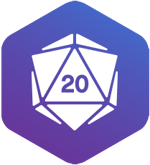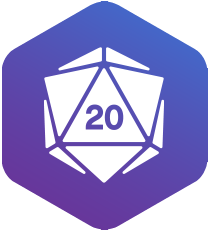
The Roll20 Team
Have you ever felt destined for greatness? Were you ever told that you were fated to slay countless monsters and that your name, or at least your exploits, would live on for eons? If so, unfortunately, this isn’t for you.
This is for the person who will bear the responsibility of helping you shape those stories.
For this blog, we’ll be gaining some insight into the perspective of TK Johnson, DM of Tales from the Mists and Indoor Recess, on Mythic Odysseys of Theros. We’ll be focusing on their perspectives on what makes Theros so unique compared to other D&D settings, the gods and epic monsters of Theros, and how they’ve shaped the story and game to help their players carve their names into Theros history.
For TK, What sets Theros apart from other D&D worlds comes down to one word: Heroism. In the world of Theros, the “call” of heroism is less of a call and much more of a shout. In worlds like Ravnica, or even Ravenloft, being a hero and saving the day is a choice.
In Theros, those who are hailed as heroes are called to it, sometimes long before they know, or are even born. The heroes of Theros are fallible, but the gods, their destinies, Fate, and their dedication to heroism push them to greatness and refuse to let them fail. The whims of the gods and Fate are entertained, often whether the hero accepts it or not.
With regards to the gods of Theros, TK is especially excited to see how their players work within the setting’s unique Piety system. The Piety system included in the Theros setting is an expanded form of the modified Renown system from the Dungeon Master’s Guide. Within the system, adherence to the tenets and whims of one’s god are rewarded, with specific milestones rewarding the players with specific abilities.
But the Piety system is a coin, and on the other side of that coin is Impiety, focused on those who reject the gods. Impiety, compared to Piety, grants neither rewards nor consequences. It’s a rejection of the gods outright, and that lack of favor is, in and of itself, a consequence of player action. TK is a big fan of players reaping the consequences of their actions, for good or bad.
An aspect of Mythic Odysseys of Theros that TK appreciates from a DM’s perspective is the abundance of lore provided for the gods of Theros. Ample motivation and resources are provided to shape the story to your liking, while still holding each god, their champions, and machinations true to character. The guesswork is removed while still providing space to make the story your own, which is an invaluable tool for DMs.
TK is a master at horror and loves to throw challenges at their players, so they’re gravitating towards the epic monster Arasta was basically destiny. Astra is one of three included Mythic Monsters, ultra-difficult enemies made to provide a different challenge for heroes to face, forcing players to really work to save the day and hopefully come out on the other side alive to tell their own story. Much thought has been put towards how best to include this mechanic in the story being shaped by TK and their players, and the application of it will for sure be a sight to behold.
For inspiration for this campaign, TK has drawn from Disney’s Hercules, My Hero Academia, and some choice snippets from the included Theros adventure module No Silent Secret.
As their players chose to eschew the use of both the regular races seen in most D&D campaigns and preferred some seen as more monstrous, TK made use of the Class Modifier Module by Gabe Hicks to break from the inherent bioessentialism of D&D.
At its base, Theros is about the intertwined lives, machinations, and whims of heroes and gods. In TK’s own words, “I’m super pumped to incorporate the petty squabbles between the gods and the mysterious ways that Nyx works...but I like mortal struggles a lot more than incredible heavenly battles. I want to explore morality and mortality in a world where legends come to life.”
The gods of Theros, while powerful, are still beholden to the perceptions and faith of the mortals over eons, though they are not bound by Fate. Heroes, while mortal, are those with the drive and motivation to reject the course imposed upon them by Fate. The gods of Theros would not be if not for the mortals of the world, empowering them in a way as to provide them control over the stories they make. For DMs, there are multiple tools provided, mechanically and story-wise, to help their players create exciting tales of heroism.
No matter which side of the DM screen you fall upon, though, if you have any interest in Theros, TK’s DMing and the ensuing play in Indoor Recess is a great source of inspiration and entertainment.
This blog was written by Carl Pierre-Louis of PoC in TTRPGs. Want to keep up with Carl’s work or learn more about him? Follow him on Twitter.
As a reminder, we’re matching donations to Code2040, “a nonprofit activating, connecting and mobilizing the largest racial equity community in tech to dismantle the structural barriers that prevent the full participation and leadership of Black and Latinx technologists in the innovation economy.” Learn more and donate through our Tiltify campaign here: http://roll20.io/Tiltify-Code2040

